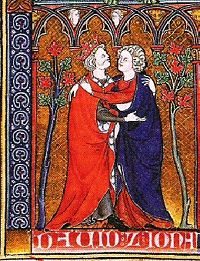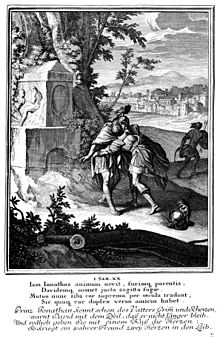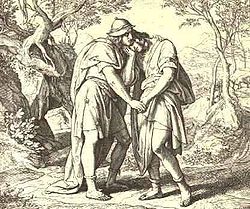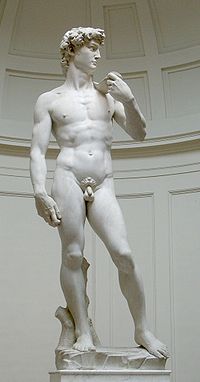- David and Jonathan
-
David (Hebrew: דָּוִד; Dāwīḏ or David) and Jonathan (Hebrew: יְהוֹנָתָן; Yəhōnāṯān or Yehonatan) were heroic figures of the Kingdom of Israel, whose covenant[1] was recorded favourably in the books of Samuel. Jonathan was the son of Saul, king of Israel, of the tribe of Benjamin, and David was the son of Jesse of Bethlehem and Jonathan's presumed rival for the crown. David eventually becomes king. The covenant they form eventually leads to David graciously seating Jonathan's son Mephibosheth, a cripple, at his own royal table instead of eradicating the former king Saul's line.[2]
The biblical text does not explicitly depict the nature of the relationship between David and Jonathan. The traditional and mainstream religious interpretation of the relationship has been one of platonic love and an example of homosociality. Some later Medieval and Renaissance literature drew upon the story to underline strong personal friendships between men, some of which involved romantic love. In modern times, some scholars, writers, as well as activists have emphasized what they interpret as elements of homoeroticism (chaste or otherwise) in the story.
Contents
Story of David and Jonathan
The relationship between David and Jonathan is mainly covered in the Hebrew Bible Book of Samuel. The episodes belong to the story of David's ascent to power, which is commonly regarded as one of the sources of the Deuteronomistic history, and to its later additions.[3]
David, the youngest son of Jesse, slays Goliath at the Valley of Elah where the Philistine army is in a standoff with the army of King Saul (Jonathan's father).[4] David's victory begins a rout of the Philistines who are driven back to Gath and the gates of Ekron. Abner brings David to Saul while David is still holding Goliath's severed head. Jonathan, the eldest son of Saul, has also been fighting the Philistines.[5] Jonathan takes an immediate liking to David and the two form a covenant:
Now it came about when he had finished speaking to Saul, that the soul of Jonathan was knit to the soul of David, and Jonathan loved him as himself. Saul took him that day and did not let him return to his father's house. Then Jonathan made a covenant with David because he loved him as himself. Jonathan stripped himself of the robe that was on him and gave it to David, with his armor, including his sword and his bow and his belt. So David went out wherever Saul sent him, and prospered; and Saul set him over the men of war.(NASB)[6]
David in the wilderness
Saul makes David a commander over his armies and offers him Michal, his daughter, in marriage.[7] David enjoys success in battle, and his growing popularity makes Saul afraid "What more can he have but the kingdom?" Saul makes several failed attempts to kill David. Learning of one of these attempts, Jonathan warns David to hide.[8]
David flees into the wilderness. David agrees to hide until Jonathan can confront his father and ascertain whether it is safe for David to stay. Jonathan approaches Saul to plead David's cause: "Then Saul's anger was kindled against Jonathan. He said to him, 'You son of a perverse, rebellious woman! Do I not know that you have chosen the son of Jesse to your own shame, and to the shame of your mother's nakedness?"[9]
Jonathan is so grieved that he does not eat for days.[10] He goes to David at his hiding place to tell him that it is unsafe for him and he must leave, and the episode ends with them parting ways.
"...David rose from beside the stone heap and prostrated himself with his face to the ground. He bowed three times, and they kissed each other, and wept with each other; David wept the more. Then Jonathan said to David, 'Go in peace, since both of us have sworn in the name of the LORD, saying, "The LORD shall be between me and you, and between my descendants and your descendants, for ever."' He got up and left and Jonathan went into the city."[11]
The death of Jonathan
As Saul continues to pursue David, the pair renew their covenant, after which they do not meet again. Eventually Saul and David are reconciled. Jonathan, however, is slain on Mt. Gilboa along with his two brothers Abinadab and Malchi-shua, and there Saul commits suicide.[12] David learns of Saul and Jonathan's death and chants a lament,[13] which in part says:
Saul and Jonathan, beloved and pleasant in their life, And in their death they were not parted; They were swifter than eagles, They were stronger than lions... "How have the mighty fallen in the midst of the battle! Jonathan is slain on your high places. "I am distressed for you, my brother Jonathan; You have been very pleasant to me. Your love to me was more wonderful Than the love of women. "How have the mighty fallen, And the weapons of war perished!" [14]
Views
Jewish Interpretation
"The sages characterized the relationship between Jonathan and David in the following Mishnah:
“Whenever love depends on some selfish end, when the end passes away, the love passes away; but if it does not depend on some selfish end, it will never pass away. Which love depended on a selfish end? This was the love of Amnon and Tamar. And which did not depend on a selfish end? This was the love of David and Jonathan. (Avot 5:15)"[15]
Rabbi Shimon ben Tzemach Duran (Spain, North Africa 14th-15th century) delineated the significance of this mishnah:
“Anyone who establishes a friendship for access to power, money, or sexual relations; when these ends are not attainable, the friendship ceases…love that is not dependent on selfish ends is true love of the other person since there is no intended end.” (Magen Avot – abridged and adapted translation)[16]
Traditional interpretation
A platonic interpretation for the relationship between David and Jonathan has been the mainstream view found in biblical exegesis, as led by Jewish and Christian writers. This argues that the relationship between the two, although strong and close, is ultimately a platonic friendship. The covenant that is made is political, and not erotic; while any intimacy is a case of male bonding and homosociality.
David and Jonathan's love is understood as the intimate camaraderie between two young soldiers with no sexual involvement.[17][18] The books of Samuel do not actually document physical intimacy between the two characters aside from "kissing,"[19] while missing are euphemisms the Bible uses for sexual relations, and nothing indicates that David and Jonathan slept together. Neither of the men are described as having problems in their heterosexual married life. David had an abundance of wives and concubines as well as an adulterous affair with Bathsheba, and apparently suffered impotence only as an old man, while Jonathan had a five year-old son at his death.[20]
In response to the argument that homoeroticism was edited out, some traditionalists who subscribe to the Documentary Hypothesis note the significance of the lack of censoring of the descriptions at issue, in spite of the Levitical injunctions against homoerotic contact. Gagnon notes, "The narrator’s willingness to speak of David’s vigorous heterosexual life (compare the relationship with Bathsheba) puts in stark relief his (their) complete silence about any sexual activity between David and Jonathan."[21]
Presuming such editing would have taken place, Martti Nissinen comments, "Their mutual love was certainly regarded by the editors as faithful and passionate, but without unseemly allusions to forbidden practices ... Emotional and even physical closeness of two males did not seem to concern the editors of the story, nor was such a relationship prohibited by Leviticus." Homosociality is not seen as being part of the sexual taboo in the biblical world.[22]
Medieval and Renaissance allusions
Medieval literature occasionally drew upon the Biblical relationship between David and Jonathan to underline strong personal and intimate friendships between men. The story has also frequently been used as a coded reference to homoerotic relations when the mention was socially discouraged or even punished.
The anonymous Life of Edward II, ca. 1326 AD, wrote: "Indeed I do remember to have heard that one man so loved another. Jonathan cherished David, Achilles loved Patroclus." We are also told that King Edward II wept for his dead lover Piers Gaveston as: "... David had mourned for Jonathan." Similarly, Roger of Hoveden, a twelfth century chronicler, deliberately drew comparisons in his description of "The King of France (Philip II Augustus) [who] loved him (Richard the Lionheart) as his own soul."
Both the Renaissance artists Donatello and Michelangelo brought out strong homoerotic elements in their respective sculptures depicting the youthful David.[23]
Abraham Cowley's Davideis (1656) as an epic poem deals abundantly with the friendship motif. George Frederic Handel's oratorio Saul (1739) contains a setting of David's lament upon the death of Jonathan.
Modern interpretations
Homoeroticism
 David and Jonathan
David and Jonathan
The Biblical account of David and Jonathan has been read by some as the story of two lovers.
"La Somme le Roy", 1290 AD; French illuminated ms (detail); British MuseumSome modern scholars and writers have interpreted the love between David and Jonathan as more intimate than platonic friendship. This was first pioneered by Horner, then rehearsed by Boswell and Halperin.[24][25] This interpretation views the bonds the men shared as romantic love, regardless of whether or not the relationship was physically consummated. Jonathan and David cared deeply about each other in a way that was arguably more tender and intimate than a platonic friendship.
David's praise in 2 Samuel 1:26 for Jonathan's 'love' (for him) over the 'love' of women is considered evidence for same-sex attraction, along with Saul's exclamation to his son at the dinner table, "I know you have chosen the son of Jesse - which is a disgrace to yourself and the nakedness of your mother!" The "choosing" (bahar) may indicate a permanent choice and firm relationship, and the mention of "nakedness" (erwa) could be interpreted to convey a negative sexual nuance, giving the impression that Saul saw something indecent in Jonathan's and David's relationship.[26]
Some also point out that the relationship between the two men is addressed with the same words and emphasis as other love relationships in the Hebrew Testament, whether heterosexual or between God and people: e.g. 'ahava' or אהבה.[27][28][29][30][31][32][33][34]
When they are alone together, David confides that he has "found grace in Jonathan's eyes", a phrase proponents say normally refers to romantic or physical attraction. Throughout the passages, David and Jonathan consistently affirm and reaffirm their love and devotion to one another, and Jonathan is willing to betray his father, family, wealth, and traditions for David.
That there is more than mere homosociality in the dealings of David and Jonathan is asserted by two recent studies: the Biblical scholar Susan Ackerman,[35] and the Orientalist Jean-Fabrice Nardelli.[36] Ackerman and Nardelli argue that the narrators of the books of Samuel encrypted same-sex allusions in the texts where David and Jonathan interact so as to insinuate that the two heroes were lovers. Ackerman explains this as a case of liminal, viz. transitory, homosexuality, deployed by the redactors as a textual means to assert David's rights against Jonathan's: the latter willingly alienated his princely status by bowing down, sexually speaking, to the former. Nardelli disagrees and argues that the various covenants Jonathan engaged David into as the superior partner gradually elevated David's status and may be seen as marriage-like.
Susan Ackerman also believes that there is highly eroticized language present in six different sections in the Hebrew Bible in regards to the relationship of David and Jonathan.[37] The six sections she mentions are 1) David and Jonathan's first meeting in 1 Sam. 18:1-18:4 2) the most important description of David and Jonathan's first few meetings in 1 Sam 19:1-19:7. 3) the incident of Saul berating Jonathan for his friendship with David in 1 Sam 20:30-20:34 4) David fleeing from the court of King Saul in 1 Sam. 20:1-20:42 5) the description of David and Jonathan's final meeting in 1 Sam. 23:15-23:18 and 6) David's lament (the Song of the Bow) for Saul and Jonathan. Of these six examples, Ackerman identifies the most important example being the last one (the Song of the Bow) due to David's assertion that Jonathan's love to David "was more wonderful than the love of women".[38]
Although David was married, David himself articulates a distinction between his relationship with Jonathan and the bonds he shares with women. David is married to many women, one of whom is Jonathan's sister Michal, but the Bible does not mention David loving Michal (though it is stated that Michal loves David).
Counter-arguments
Traditional religious apologists point out that neither the books of Samuel nor Jewish tradition documents sanctioned romantic or erotic physical intimacy between the two characters, which the Bible elsewhere makes evident when between heterosexuals, most supremely in the Song of Solomon. It is also known that covenants were common, and that marriage was a public event and included customs not seen in this story.[39][40]
The platonic interpretation of David and Jonathan's relationship is seen as being advocated by some Christian writers particularly for theological and methodological reasons. Two modern advocates named are Robert A. J. Gagnon,[41] and the Assyriologist Markus Zehnder,[42] and as such is consistent with commonly held theological views condemning same sex relations.[43]
Those who hold to this position on David and Jonathan may work from the theological foundation of Biblical infallibility and a more literalistic approach to exegesis, so that while interpretations are understood within the context of their particular literary genres, a wide range of metaphorical meanings of the historical narratives, in particular, are disallowed.[44][45][46][47] The disrobing aspect is seen as partial (especially in the Hebrew), that of his robe and outer garments, his sword, bow and “girdle," which denotes part of a soldiers armor in 2Samuel 20:8 and 2Kings 3:21. In addition, this action is evidenced as having a clear ceremonial precedent under Moses, in which God commanded, "And strip Aaron of his garments, and put them upon Eleazar his son",[48] in transference of the office of the former upon the latter. In like manner, Jonathan would be symbolically and prophetically transferring the kingship of himself (as the normal heir) to David, which would come to pass.[49][50][51]
Even if the mention of "nakedness" in 1 Samuel 20:30 could be interpreted to convey a negative sexual nuance, this could be referring to Ahinoam rather than Jonathan. Jon Levenson and Baruch Halpern suggest that the phrase suggests "David's theft of Saul's wife", and that the verse supports the construction that Ahinoam, the wife of Saul is the same Ahinoam who became David's wife.[52]
In platonic respects, such as in sacrificial loyalty and zeal for the kingdom, Jonathan's love is seen as surpassing that of romantic or erotic affection,[53] especially that of the women David had known up until that time. The grammatical and social difficulties are pointed out in respect to 1 Samuel 18:21,[54] as well as the marked difference in the Bible between sensual kissing (as in Song of Songs) and the cultural kiss of Near Eastern culture whether in greeting or as expression of deep affection between friends and family (as found throughout the Old and New Testaments).[55] The strong emotive language expressed by David towards Jonathan is also argued to be akin to that of platonic expressions in more expressive or pre-urban cultures.[56]
Literature and legacy
At his 1895 trial, Oscar Wilde cited the example of David and Jonathan in support of "the love that dare not speak its name": Such a great affection of an elder for a younger man as there was between David and Jonathan, such as Plato made the very basis of his philosophy, and such as you find in the sonnets of Michelangelo and Shakespeare.[57]
Contemporary American literature also show attempts at fictionalisation of the David narrative. Gladys Schmitt's 1946 novel David the King took a risk, especially for its time, in portraying David's relationship with Jonathan as overtly homoerotic, but was ultimately panned by critics as a bland rendition of the title character.
In Thomas Burnett Swann's Biblical fantasy novel How are the Mighty Fallen (1974) David and Jonathan are explicitly stated to be lovers. Moreover, Jonathan is a member of a winged semi-human race (possibly nephilim), one of several such races co-existing with humanity but often persecuted by it.
The erotics of the battle between David and Goliath feature in Richard Howard's poem ''The Giant on Giant Killing" in his book Fellow Feelings (1976).
Allan Massie wrote "King David" (1995), a novel about David's career which portrays the king's relationship to Jonathan and others as openly homosexual.
In modern times, in his Lambeth essay of December 2007, James Jones the Bishop of Liverpool, drew particular attention to the relationship between David and Jonathan,[58] describing their friendship as:
...emotional, spiritual and even physical. There was between them a deep emotional bond that left David grief-stricken when Jonathan died. But not only were they emotionally bound to each other they expressed their love physically. Jonathan stripped off his clothes and dressed David in his own robe and armour. With the candour of the Eastern World that exposes the reserve of Western culture they kissed each other and wept openly with each other. This intimate relationship was sealed before God - it was not just a spiritual bond it became covenantal. He concludes by affirming: Here is the Bible bearing witness to love between two people of the same gender
Nissinen has concluded[59]:
Perhaps these homosocial relationships, based on love and equality, are more comparable with modern homosexual people's experience of themselves than those texts that explicity speak of homosexual acts that are aggressive, violent expressions of domination and subjection.
Rachel Caine's Weather Warden series includes two Djinn named David and Jonathan. In flashback, the two are shown fighting in a battle as humans. When mortally wounded, Jonathan is transformed by the Earth into a Djinn, and he encompasses David in this transformation. At the beginning of the series, Jonathan is the more powerful of the two and the leader of the Djinn, with David as the second in command. This represents a reversal of their Biblical roles.
In the short-lived TV series Kings, a semi-modern update on David's story, Michelle (the equivalent of Michal) and David are in love, though Jonathan is explicitly homosexual and his feelings towards David are complicated.
Political discourse in Israel on Biblical David and Jonathan
Further information: Judaism and sexualityThe biblical text does not explicitly depict the nature of the relationship between the biblical figures of David and Jonathan, however, one may wonder on the nature of the implicit language and the choice of the Hebrew Bible's words on this relationship, especially in the two following verses:
very pleasant hast thou been unto me; wonderful was thy love to me, passing the love of women—David on Jonathan, 2 Samuel, 1:26I know you have chosen the son of Jesse - which is a disgrace to yourself and the nakedness of your mother!—Jonathan's father, 1 Samuel, 20:30The aforementioned dispute over the interpretation of the language and meaning of the bible has turned into an important political debate between the Israeli gay community and the right wing conservative as well as the general Israeli public.
The public discourse around this issue has reached its peak, when, then Knesset member, Yael Dayan, on 10 February 1993, made her famous speech on the Knesset floor, on the need for gay rights, and while quoting from Biblical Davids' words on Jonathan.
See also
Notes
- ^ http://www.biblegateway.com/passage/?search=1+Samuel+20&version=NIV 1 Samuel 20:16
- ^ Peter J. Leithart, A Son to Me, p 208-09, Canon Press, (2003).
- ^ Collins, John. Introduction to the Hebrew Bible Canada: Augsburg Fortress,2004.(p.225).
- ^ 1 Sam. 17
- ^ 1 Sam. 14
- ^ 1 Sam. 18:1-4
- ^ 1 Samuel 18:17-19
- ^ 1 Sam. 18:8
- ^ 1 Sam. 20:30
- ^ 1 Sam 20:34
- ^ 1 Sam. 20:41-21:1
- ^ http://www.biblegateway.com/passage/?search=1%20Samuel%2031:1-6&version=NASB 1 Samuel 31:1-6
- ^ http://www.biblegateway.com/passage/?search=2%20Samuel%201:17&version=NASB 2 Sam. 1:17
- ^ http://www.biblegateway.com/passage/?search=2 Samuel+1&version=NASB 2 Sam. 1:23-27 (NASB))
- ^ http://www.uscj.org/israelcenter/haftarah/Toldot5765.html Parshat Toldot, Mahar Hodesh,(1 Samuel 20:18-42) November 13, 2004
- ^ http://www.uscj.org/israelcenter/haftarah/Toldot5765.html Parshat Toldot, Mahar Hodesh,(1 Samuel 20:18-42) November 13, 2004
- ^ Matthew Henry, 1Samuel 18:1-5; 2Samual 1:17-27
- ^ International Standard Bible Encyclopedia, David, Jonathan and David
- ^ 1 Sam. 21:41
- ^ James B. deYoung, Homosexuality, p. 290
- ^ Prof. Dr. Robert A. J. Gagnon
- ^ Martti Nissinen, Kirsi Stjerna, Homoeroticism in the Biblical World, p. 56
- ^ Rocke, Michael. 1996. Forbidden Friendships: Homosexuality and Male Culture in Renaissance Florence. New York and Oxford: Oxford University Press.
- ^ Boswell, John. Same-sex Unions in Premodern Europe. New York: Vintage, 1994. (pp. 135-137)
- ^ Halperin, David M. One Hundred Years of Homosexuality. New York: Routledge, 1990. (p. 83)
- ^ Martti Nissinen, Homoeroticism in the Biblical World, Minneapolis, 1998
- ^ http://en.wikipedia.org/wiki/Cultural_views_of_love#Jewish
- ^ Hebrew word #160
- ^ Gen. 29:20
- ^ 2 Sam. 13:15
- ^ Pro. 5:19
- ^ Sgs. 2:4-7
- ^ Sgs. 3:5-10
- ^ Sgs. 5:8)
- ^ When Heroes Love:. The Ambiguity of Eros in the Stories of Gilgamesh and David (New York & Chichester, Columbia University Press, 2005), pp. 165-231
- ^ Homosexuality and Liminality in the Gilgamesh and Samuel (Amsterdam, Hakkert, 2007), pp. 28-63
- ^ http://books.google.com/books?id=ATKodvnYS4EC&printsec=frontcover&dq=When+Heroes+Love:.+The+Ambiguity+of+Eros+in+the+Stories+of+Gilgamesh+and+David&source=bl&ots=yuIxT4-AQx&sig=-1FWMaWuP39q393kYu7TAepj0rc&hl=en&ei=vmDZTICYLYeglAeohu2_CQ&sa=X&oi=book_result&ct=result&resnum=3&ved=0CB4Q6AEwAg#v=onepage&q&f=false
- ^ http://books.google.com/books?id=ATKodvnYS4EC&printsec=frontcover&dq=When+Heroes+Love:.+The+Ambiguity+of+Eros+in+the+Stories+of+Gilgamesh+and+David&source=bl&ots=yuIxT4-AQx&sig=-1FWMaWuP39q393kYu7TAepj0rc&hl=en&ei=vmDZTICYLYeglAeohu2_CQ&sa=X&oi=book_result&ct=result&resnum=3&ved=0CB4Q6AEwAg#v=onepage&q&f=false
- ^ Albert Barnes, Judges 14:10
- ^ Sketches of Jewish Social Life. Cp. 9 (Edersheim)
- ^ The Bible and Homosexual Practice. Texts and Hermeneutics (Nashville, Abingdon Press, 2001), pp. 146-154
- ^ Observations on the Relationship Between David and Jonathan and the Debate on Homosexuality, Westminster Theological Journal 69 (2007), pp. 127-174
- ^ "Welcoming But Not Affirming," by Stanley J. Grenz
- ^ The Authority Of God's Law Today, Greg L. Bahnsen
- ^ Hermeneutical issues in the use of the Bible to justify the acceptance of homosexual practice
- ^ Guenther Haas, Hermeneutical issues in the use of the bible to justify the acceptance of homosexual practice
- ^ Lionel Windsor, The Bible and Homosexuality
- ^ Numbers 20:26; cf. Esther 3:6
- ^ Gagnon, The Bible and Homosexual Practice, pp. 146-54
- ^ Markus Zehnder, “Observations on the Relationship between David and Jonathan and the Debate on Homosexuality,” Westminster Theological Journal 69.1 [2007]: 127-74)
- ^ Thomas E Schmidt, “Straight or Narrow?”
- ^ Jon D. Levenson and Baruch Halpern, "The Political Import of David's Marriages," JBL 99 [1980] 515.
- ^ Matthew Henry
- ^ Keil and Delitzsch; and is seen as referring to Merab and Michal: John Gill; T. Bab. Sanhedrin, fol. 19. 2.
- ^ Gagnon, ibid
- ^ Regan, P. C; Jerry, D; Narvaez, M; Johnson, D. Public displays of affection among Asian and Latino heterosexual couples. Psychological Reports. 1999;84:1201–1202
- ^ Neil McKenna, The Secret Life of Oscar Wilde, London, 2004
- ^ http://www.liverpool.anglican.org/index.php?p=215
- ^ Martti Nissinen, Homoeroticism in the Biblical World, Minneapolis, 1998
References
- Jonathan Loved David: Homosexuality in Biblical Times (ISBN 0-664-24185-9) by Tom Horner, Ph.D. (pgs 15-39)
- What the Bible Really Says About Homosexuality (ISBN 1-886360-09-X) by Daniel A. Helminiak, Ph.D. (pgs 123-127)
- Lord Given Lovers: The Holy Union of David & Jonathan (ISBN 0-595-29869-9) by Christopher Hubble. (entire)
- "The Significance of the Verb Love in the David-Jonathan Narratives in 1 Samuel" by J. A. Thompson from the Vestus Testamentum 24 (pgs 334-338)
- John Boswell's Same-Sex Unions in Premodern Europe (pgs. 67-71)
- Craig Williams' Yale University Ph.D. Dissertation Homosexuality and the Roman Man: A Study in the Cultural Construction of Sexuality (pg. 319).
- Martti Nissinen, Homoeroticism in the Biblical World, Minneapolis, 1998
- Unprotected Texts: The Bible's Surprising Contradictions About Sex and Desire
- God and Sex: What the Bible Really Says
Categories:- David
- Articles about multiple people
- Homosexuality and Christianity
- LGBT history in Israel
- Homosexuality and Judaism
- Old Testament
- Books of Samuel
- Judaism and sexuality
Wikimedia Foundation. 2010.





